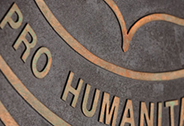
"Of all the investments I have ever made, my investment in Wake Forest University has been the most profitable," says Henry B. Cooper, Jr. ('53) of Beaufort, N.C.
In these trying economic times, talk of a good investment is particularly refreshing. However, to Henry Cooper, profit comes not only in terms of financial payoff but also in the satisfaction of having created a legacy to benefit the alma mater that is dear to him for many reasons.
Cooper grew up in the town of Wake Forest, was reared by his mother and, after the death of his father while Cooper was a young child, also by his stepfather, Forrest Clonts. Professor Clonts taught European and English history on both the old and new campuses of Wake Forest. Inspired by their stepfather's close involvement with the University, Henry Cooper and his younger brother, Bailey Cooper ('53), both became Wake Forest graduates.
After pursuing other interests for several years, Cooper returned to Wake Forest University in 1986 to work with Dean Mark Reece. Among his responsibilities were functioning as what he jokingly called "the campus parole officer," connecting young undergraduates in need of a means to work off demerits with opportunities to serve local nonprofit agencies. His experience witnessing positive results through service reinforced Henry's belief in the power of volunteerism to enrich the lives of both the recipient and the donor.
In 1987, the Office of Volunteer Services was created as a co-venture with Chaplain Ed Christman in a small shared office in Reynolda Hall. Chaplain Christman promised that eventually the Office of Volunteer Services would have its own space. Run and energized by students, the Office grew in popularity over time. In 1989, the students within the Office reached out to all Wake Forest students who were interested in service. Together they began the Volunteer Service Corps, which today is one of the largest student groups on campus. The group describes itself as "a student-run organization dedicated to furthering the University's motto of Pro Humanitate by engaging students, faculty, and staff in meaningful volunteer service."
Since its creation, scores of Wake Forest University students and the Winston-Salem community at large have benefited from the Office of Volunteer Service and the programs it oversees, such as the Volunteer Service Corps, D.E.S.K. (Discovering Education through Student Knowledge), Campus Kitchen, Project Pumpkin, and both domestic and international service trips. D.E.S.K. provides school supplies and desks of their own to area elementary school-aged children who need a place to study and learn in their homes. After meeting the child for whom the desk is intended, teams of Wake Forest students design and paint the desks to meet each child's individual creative specifications. Campus Kitchen uses cooked but never served food from the campus dining hall to make healthy and nutritious meals for the needy. In their first year alone, they served over 5,000 meals in the Winston-Salem community. Project Pumpkin provides a safe environment every Halloween at Wake Forest's Reynolda campus for over 1,000 children from local agencies to enjoy trick-or-treating, carnival games, clowns, and entertainment provided by students and faculty. Each year students organize service trips to areas in need such as New Orleans, Russia, and Vietnam. One of the international service trips even involved the leader of the Volunteer Service Corps working for a summer with Mother Teresa in Calcutta, India.
Henry Cooper's life was so touched by his involvement with the Office of Volunteer Service that he wanted to help ensure that its programs would be available for generations to come. As part of his overall estate planning, Mr. Cooper established three charitable remainder trusts to support the University, one of which will benefit the Office of Volunteer Service. Not only will Mr. Cooper's charitable remainder trusts benefit Wake Forest, but they have the added benefit of helping him reach his long-term financial goals. The unitrust was funded with appreciated stock, thus allowing Mr. Cooper to avoid capital-gain tax on the appreciation. He will receive income from the investment for the remainder of his lifetime, and the University will receive the principal thereafter.
"Creating this trust was a way I could receive income for the remainder of my days but also embody the spirit of Pro Humanitate, which is so vital in my life, thanks in large part to my experiences at Wake Forest University as both a student and volunteer."
Aside from his experiences as a student, staff member, and volunteer, Henry Cooper's life has recently become even further intertwined with his beloved alma mater. Former classmates may be interested to know that following the death of his wife and friend of 51 years, Virginia, Mr. Cooper recently married Elizabeth ("Bet") Isbell, ('51), whose father, Nevill Isbell, was a Wake Forest University chemistry professor.
The Cooper legacy will live on at Wake Forest for generations through the contributions that he made here of his time, financial support, and dedication to the University.